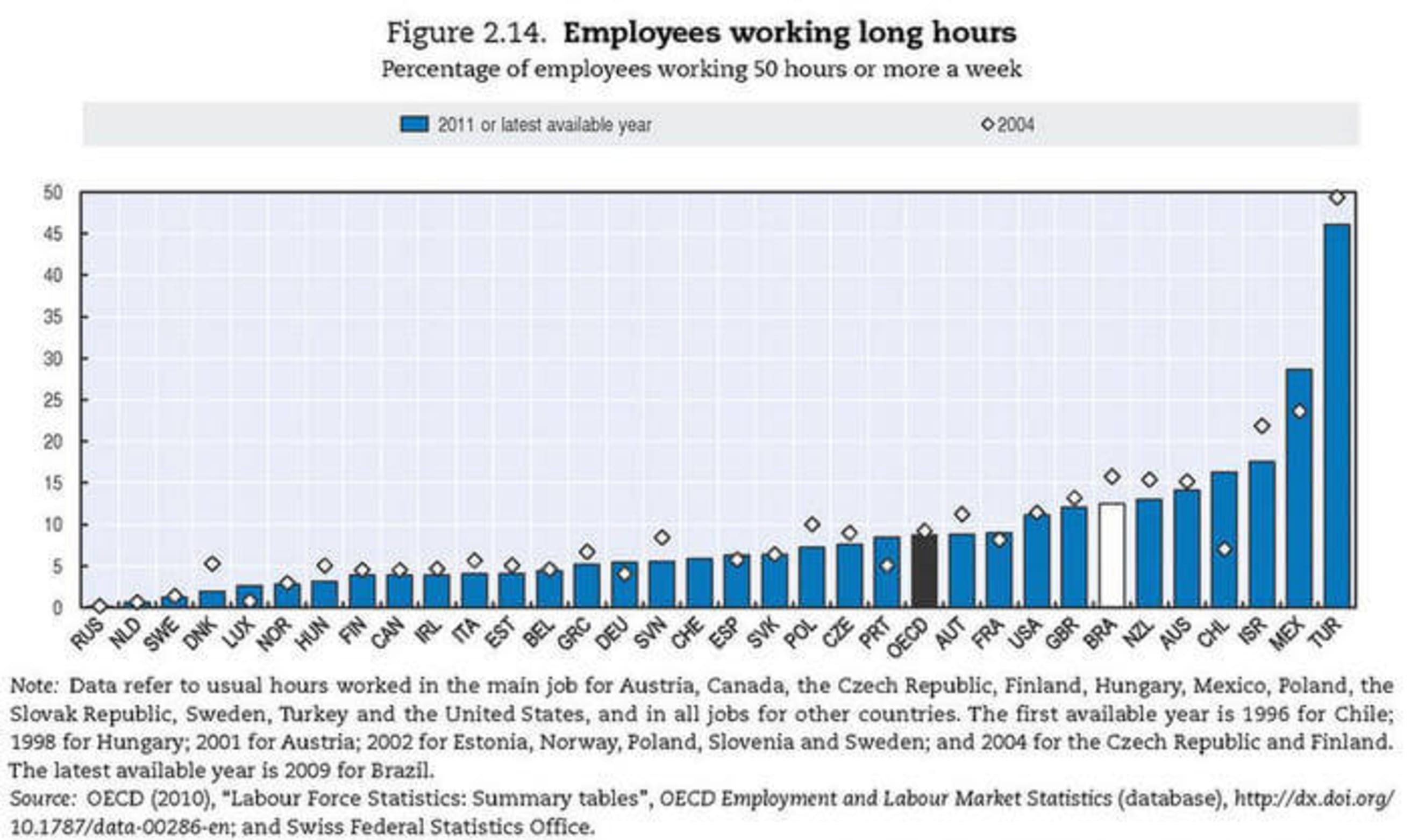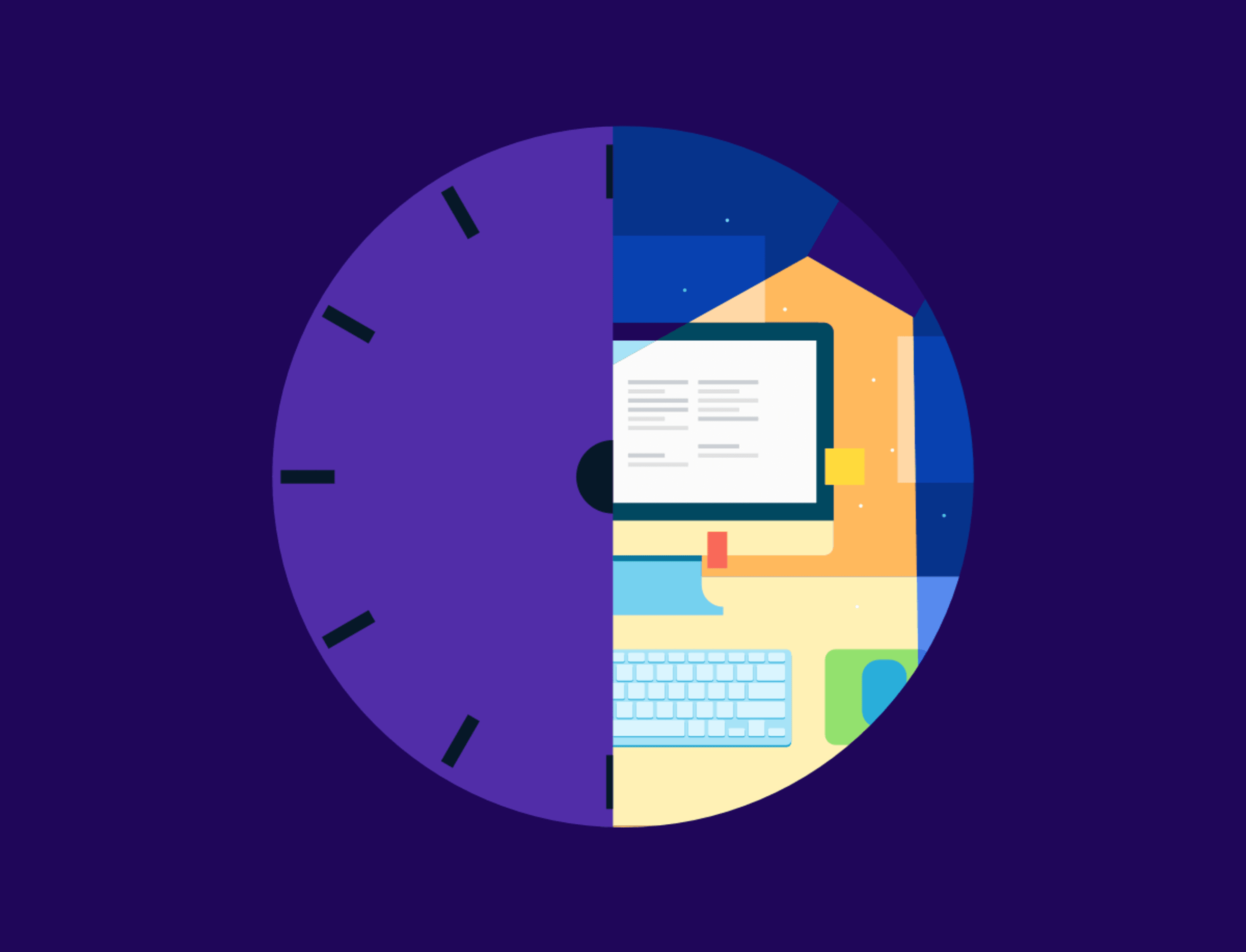Simply put, working long hours is bad for your health and bad for your work.
It may not feel like it when 6pm, 7pm, or even 9pm rolls around and you're still at the office, but over time those extra hours build up into increased risk of cardiovascular disease, generally poor health, and fatigue.
One study carried out across three continents found "those who work more than 55 hours a week have a 33% increased risk of stroke compared with those who work a 35- to 40-hour week". Overworked employees also had a 13% increased risk of coronary heart disease.
While this study doesn’t prove direct cause-and-effect, the fact that there's such a high correlation between increased health risks and overworking should give us pause.

And it’s not just inconvenient to work extra hours; it’s actually bad for your productivity. Studies have shown that, beyond a certain point, working more hours results in diminishing returns—that is, each additional hour we put in at the office is less productive than the last. One study of British factory workers during World War II found that 49 hours was the point where diminishing returns kicked in. And other studies have found that how you spend your time at work correlates more closely to your output than how many hours you put in.
Despite the evidence that long work hours accomplish very little, our tendency to work far beyond the 40-hour workweek shows no sign of stopping, at least not in the US. According to the Organisation for Economic Co-operation and Development (OECD) Better Life Index, the US ranks 9th among 34 OECD countries for the number of people working long hours.
We live in a society that equates busyness with importance and long work hours with a commitment to our jobs. Meanwhile, the boundaries between work and life are becoming increasingly blurred with the trend toward flexible work schedules, location-independent jobs, and the ability to carry our work around in our pockets wherever we go. Ironically, the flexibility that allows us to be the masters of our own schedules also allows us to never fully turn off, even when it’s in our best interest to do so.
When we don’t contain our work hours, we sacrifice the time we need for the activities that replenish our energy stores. Things like exercise, family dinners, meeting up with friends, and even spending time in nature are imperative for long-term mental and physical health, and, ultimately, our productivity.
So how can you leave work on time and avoid the health risks of overworking? Well, if your boss requires long hours, you might be in a bind. But if you're holding yourself back by staying at work well past knock-off time, it's time to look at why you feel you need to work long hours, and how to overcome that.
Whether it's proving your commitment, trying to get more done, or just feeling guilty about leaving “early,” these four approaches can help you start getting out of the office at a reasonable hour, improving your health and productivity at the same time.
1. Build an end-of-day routine
For about half of the year, I struggled to get up early. I wanted to be a morning person, getting hours of work done before lunch, but I couldn't drag myself out of bed before 8 am... and often much later.
One of the things that helped me finally crack this habit was developing a morning routine. When I get out of bed, I start a cascade of events that run, one after another, to keep me awake and get me ready for the day. Right now, that means making coffee, practicing French, reading, doing a few push-ups, then jumping in the shower. Each event kicks off the next one, and I don't have to think about whether I'll return to bed.
The same process that gets me out of bed can help you get out of the office. You might have heard of people with wind-down routines to help them get ready for bed and keep a regular sleeping schedule. In the same way, you can wind down at a regular time every day to help you get out of the office on time.
The best thing about routines is they can help you get motivated when you don’t feel like it. Routines let you fall back on your everyday habits to ensure you always leave work on time (in this case) without relying on willpower or memory.
According to James Clear, getting started produces momentum that helps you to keep going—you need to get started before you’re motivated. Motivation will follow. A routine can help you with the getting started part: if you tidy your desk, close your inbox, and plan for tomorrow at the same time every day, this routine will give you the momentum to head out the door on time without you trying to do so. As Charles Duhigg, author of The Power of Habit says, “Routine basically gives us the mental freedom to think about what's actually important”.
Routines aren’t just good for getting things done. Research has shown that routine and order can make our lives feel more meaningful. One study showed people who did the same things daily found life more meaningful than those who didn’t have consistent routines.
We’ve written before about the things successful people incorporate into their end-of-the-day routine to leave work on time and set themselves up to start the next day off right:
- Tidy your desk, save everything you’re working on, and close all your tabs and windows.
- Review your completed tasks at the end of each day.
- Plan tomorrow’s to-do list.
- Leave open just the one tab you need to finish your Most Important Task in the morning.
- Leave a quick win to do early tomorrow.
- Break down the tasks you’ve been avoiding into smaller, more manageable ones.
2. Set a hard finish time to leave work
One of the easiest ways to stay at work too late is to have no real "go home" time. When I did shift work if my shift ended at 5 pm, you can bet I was watching the clock from 4:55. But with flexible schedules and more work to do than we can keep up with, it's all too easy to work beyond what's healthy.
One way to make this work is to schedule something for immediately after your knock-off time. Having an appointment you need to go to will force you to get out the door, and the more often you do this, the more you'll get used to structuring your day to leave work on time.
This is the method I used to take back my afternoons from the grip of procrastination. Working from home gave me so much flexibility that I struggled to finish anything after lunch, knowing I could work into the night to meet a deadline. This was a bad strategy, especially since I'm a morning lark and don't work at my best in the evenings.
This is not so unusual. It stems from a phenomenon known as Parkinson’s law, which says that “work expands to fill the time available for its completion.” In other words, your work will take as much time as you have to complete it. If you only have two hours, you’ll get it done in two hours. If you have all day, it’ll take you all day.
I finally made my afternoons productive again by setting a hard cut-off time for my work day to end and scheduling an event at that time or shortly after. Sometimes that would be dinner with a friend or attending an event. Most days, it was simply a scheduled appointment to go for a run on my treadmill. I kept that appointment, pushing me to finish all the day's work by my cut-off time.
Here’s what I wrote about this earlier:
When I've tried this without an event like exercise or dinner at 5:30, it doesn't work as well. The deadline becomes elastic and I end up working longer—or just thinking I can, which means I don't get as much done.
It's that appointment I "must keep" that really makes this approach work.
I'll often look at the clock around 3 p.m. and realize I've been wasting time since lunch, but realizing that there are only two and half hours remaining in my work day, I kick back into gear.
Sean Ogle found the same thing when he tried to stop his workday at noon:
[I] gave myself permission to stop working at noon. For the first week, this was nearly impossible, but as I started scheduling things early in the afternoon, the need to be more productive in the morning became greater.
Sean scheduled sports, attended festivals, and set up lunch and coffee dates with friends to help him stick to that deadline.
Here are some ideas for events you can schedule after work:
- Meet a friend or your spouse for dinner.
- Agree to be home for dinner at a particular time.
- Go to the gym or outside for exercise after work (meet a friend for a workout if that helps you stick to your plan).
- Book a haircut or dentist appointment after work.
- Sign up for a class or team sport.
Make sure you put these into your calendar and treat them as events you must be on time for. This urgency will force you to be ready to go on time.
3. Plan your day more realistically
When your to-do list isn't complete, it's easy to stay at work for longer than you'd like to. It might be unhealthy, but we're slaves to our task lists and can't bear to admit we didn't get through everything today.
If this sounds like you, there's a simple (though not necessarily easy) way to curb this habit. It's all about how you plan your to-do list each day.
Planning more than you can get done is a surefire way to set yourself up for to-do list failure. We so often underestimate how long tasks will take, and how much we'll be interrupted throughout the day. And we overestimate how much we can get done.
This problem with planning, officially known as the planning fallacy, happens to the best of us. The Sydney Opera House was opened 10 years later than originally estimated and had to be scaled back from the initial plans to get it finished. It also cost $102 million dollars to build, despite plans to complete it for just $7 million.
Our tendency to fall victim to the planning fallacy comes from having too much optimism. We tend not to plan for hiccups, which inevitably pop up along the way.
The secret to overcoming this fallacy is to flip our expectations:
- Underestimate how much you can get done in a day.
- Overestimate how long each task will take.
- Overestimate how much you'll get interrupted during the day.
Plan to be interrupted. Plan to spend double the time you think you really need on every task. And plan fewer tasks for your day.
Professor, author, and productivity expert Cal Newport suggests planning your day backward, starting from home time. Assume you're going home at 5 pm, or 5:30, and plan back from there so your day isn't more full than you can handle.
Cal also suggests focusing on doing fewer things better:
You're judged on what you do best so if you want to have as much success as possible you're always better off doing fewer things but doing those things better.
A shorter task list can actually help you get more done, counterintuitive as it sounds. Say you normally plan 10 tasks per day, on average. And most days, you get an average of 5 or 6 done.
Now, if you plan just three tasks to do today, you'll likely get them all done. You'll also have less opportunity to jump between different tasks when you only have three to choose from, so you may find it easier to focus. And when those three tasks are done, you'll feel great. You'll have built enough momentum to get through more than you'd planned—but you'll feel good about doing it because you've already met your daily minimum requirement.
You may finish 5 or 6 things in a day. Maybe even more. But you won't go home with an unfinished to-do list anymore. Instead, your list will be completed, with bonus tasks added. That's a much better feeling to leave work with, and you'll be able to walk out of the office on time, knowing you got your to-do list done well before home time.
4. Re-frame the way you think about "leaving work"
It can be tough to give yourself the freedom to leave work. You might feel guilty that you're leaving before others or that you're stopping work at all. You might worry that you're not committed enough if you leave work right on time.
This is all perspective, of course. Nothing about leaving work on time affects how hard you work when you're there or how good your work is.
So how can you overcome this nagging feeling that leaving work on time is not okay? By reframing how you think about it.
Rather than "I'm leaving work now," try thinking of it as moving towards something else. For instance:
- "I'm going home to spend time with my family now."
- "I'm going to a school event to support my kids now."
- "I'm going to the gym to keep my body in shape now."
- "I'm going home to cook now because it helps me relax, and good food helps me stay healthy."
- "I'm going to meet a friend for dinner now because regular socializing helps me feel connected to others."
- "I'm going to get a haircut now because looking good helps me feel confident."
Framing your next activity as something important to your life can make it more obvious why it's important that you leave work on time. Looking after your health, staying connected to friends and family, and enjoying your favorite hobbies or relaxing activities make you a more well-rounded human—which is important to ensure you produce the best work possible.
Whether you're working enough to be worried about increased health risks, want to spend more time with family, or you want to develop a more regular work routine, these approaches can help you go home on time every day—and still be happy with what you've achieved.

